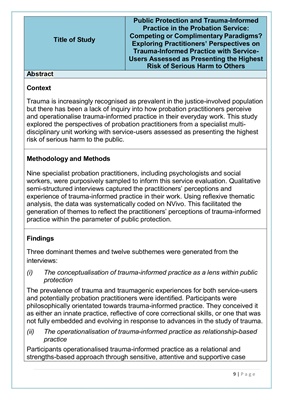
9 | P a g e
Title of Study
Public Protection and Trauma-Informed
Practice in the Probation Service:
Competing or Complimentary Paradigms?
Exploring Practitioners' Perspectives on
Trauma-Informed Practice with ServiceUsers
Assessed as Presenting the Highest
Risk of Serious Harm to Others
Abstract
Context
Trauma is increasingly recognised as prevalent in the justice-involved population
but there has been a lack of inquiry into how probation practitioners perceive
and operationalise trauma-informed practice in their everyday work. This study
explored the perspectives of probation practitioners from a specialist multidisciplinary
unit working with service-users assessed as presenting the highest
risk of serious harm to the public.
Methodology and Methods
Nine specialist probation practitioners, including psychologists and social
workers, were purposively sampled to inform this service evaluation. Qualitative
semi-structured interviews captured the practitioners' perceptions and
experience of trauma-informed practice in their work. Using reflexive thematic
analysis, the data was systematically coded on NVivo. This facilitated the
generation of themes to reflect the practitioners' perceptions of trauma-informed
practice within the parameter of public protection.
Findings
Three dominant themes and twelve subthemes were generated from the
interviews:
(i) The conceptualisation of trauma-informed practice as a lens within public
protection
The prevalence of trauma and traumagenic experiences for both service-users
and potentially probation practitioners were identified. Participants were
philosophically orientated towards trauma-informed practice. They conceived it
as either an innate practice, reflective of core correctional skills, or one that was
not fully embedded and evolving in response to advances in the study of trauma.
(ii) The operationalisation of trauma-informed practice as relationship-based
practice
Participants operationalised trauma-informed practice as a relational and
strengths-based approach through sensitive, attentive and supportive case